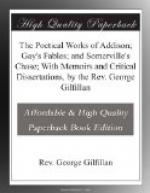Having his lips in general barred by the double bolts of caution and secretiveness, one ceases to wonder that the “invisible spirit of wine” was welcomed by him as a key to open occasionally the rich treasures of his mind; but that he was a habitual drunkard is one calumny; that he wrote his best Spectators when too much excited with wine is another; and that he “died drunk” is a third,—and the most atrocious of all, propagated though it has been by Walpole and Byron. His habits, however, were undoubtedly too careless and convivial; and there used to be a floating tradition in Holland-house, that, when meditating his writings there, he was wont to walk along a gallery, at each end of which stood a separate bottle, out of both of which he never failed, en passant, to sip! This, after all, however, may be only a mythical fable.
While, as an author, the favourite of ladies, of the young, and of catholic-minded critics generally, Addison has had, and has still, severe and able detractors, who are wont to speak of him in such a manner as this:—“He is a highly cultivated artist, but not one thought of any vivid novelty did he put out in all his many books. You become placid reading him, but think of Ossian and Shakspeare, and be silent. He is a lapidary polishing pebbles,—a pretty art, but not vested with the glories of sculpture, nor the mathematical magnitude of architecture. He does not walk a demigod, but a stiff Anglicised imitator of French paces. He is a symmetrical, but a small invisible personage at rapier practice.” Now, clever as this is, it only proves that Addison is not a Shakspeare or Milton. He does not pretend to be either. He is no demigod, but he is a man, a lady-man if you will, but the lovelier on that account. Besides, he was cut off in his prime, and when he might have girt himself up to achieve greater things than he has done. And although the French taste of his age somewhat affected and chilled his genius, yet he knew of other models than Racine and Boileau. He drank of “Siloa’s brook.” He admired and imitated the poetry of the Bible. He loves not, indeed, its wilder and higher strains; he gets giddy on the top of Lebanon; the Valley of Dry Bones he treads with timid steps; and his look up to the “Terrible Crystal” is more of fright than of exultation. But the lovelier, softer, simpler, and more pensive parts of the Bible are very dear to the gentle Spectator, and are finely, if faintly, reproduced in his writings. Indeed, the principle which would derogate from Addison’s works, would lead to the depreciation of portions of the Scriptures too. “Ruth” is not so grand as the “Revelation;” the “Song of Solomon” is not so sublime as the “Song of Songs, which is Isaiah’s;” and the story of Joseph has not the mystic grandeur or rushing fire of Ezekiel’s prophecy. But there they are in the same Book of God, and are even dearer to many hearts than the loftier portions; and so with Addison’s papers beside the works of Bacon, Milton, and Coleridge.




